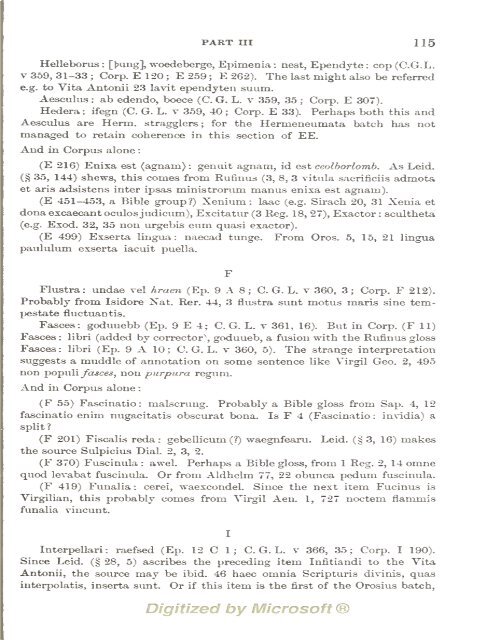the corpus, épinal, erfurt and leyden glossaries, viii - World eBook ...
the corpus, épinal, erfurt and leyden glossaries, viii - World eBook ...
the corpus, épinal, erfurt and leyden glossaries, viii - World eBook ...
You also want an ePaper? Increase the reach of your titles
YUMPU automatically turns print PDFs into web optimized ePapers that Google loves.
PART in 115<br />
Helleborus : [)>ung], woedeberge, Epimenia : nest, Ependyte : cop (C.G.L.<br />
V 359, 31-33 ; Corp. E 120 ; E 259 ; E 262). The last might also be referred<br />
e.g. to Vita Antonii 23 lavit ependyten suum.<br />
Aesculiis : ab edeudo, boece (C. G. L. v 359, 35 ; Corp. E 307).<br />
Hedera : ifegn (C. G. L. v 359, 40 ; Corp. E 33). Perhaps both this <strong>and</strong><br />
Aesculus are Herm. stragglers; for <strong>the</strong> Hermeneumata batch has not<br />
managed<br />
to retain coherence in this section of EE.<br />
And in Corpus alone :<br />
(E 216) Enixa est : (agnam) geniiit agnam, id est ceolborlomb. As Leid.<br />
?; 35, 144) shews, this comes from Rufinus (3, 8, 3 vitula sacrificiis admota<br />
: aris adsistens inter ipsas ministronmi maniis enixa est agnam).<br />
(E 451-453, a Bible group?) Xenium : laac (e.g. Sirach 20, 31 Xenia et<br />
dona excaecant oculos judicnm), Excitatiir (3 Reg. 18, 27), Exactor : scul<strong>the</strong>ta<br />
e.g. Exod. 32, 35 non urgebis eum quasi exactor).<br />
(E 499) Exserta lingua: naecad tunge. From Oros. 5, 15, 21 lingua<br />
aululima exserta iacuit puella.<br />
Flustra : undae vel hraen (Ep. 9 A 8 ; C. G. L. v 360, 3 ; Corp. F 212).<br />
Probably from Isidore Nat. Rer. 44, 3 flustra sunt motus maris sine tem-<br />
j)estate fluctuantis.<br />
Fasces: goduuebb (Ep. 9 E 4; C. G. L. v 361, 16). But in Corp. (F 11)<br />
Fasces : libri (added by corrector), goduueb, a fusion with <strong>the</strong> Rufinus gloss<br />
Fasces: libri (Ep. 9 A 10; C.G.L. v 360, 5). The strange interpretation<br />
suggests a muddle of annotation on some sentence like Virgil Geo. 2, 495<br />
non populi /a«ce«, non purpitra regum.<br />
And in Corpus alone :<br />
(F 55) Fascinatio : malscrung. Probably a Bible gloss from Sap. 4, 12<br />
fascinatio enim nugacitatis obscurat bona. Is F 4 (Fascinatio : invidia) a<br />
spUt?<br />
(F 201) Fiscalis reda : gebelHcum (?) waegnfearu. Leid. (§ 3, 16) makes<br />
<strong>the</strong> source Sulpicius Dial. 2, 3, 2.<br />
(F 370) Fuscinula : awel. Perhaps a Bible gloss, from 1 Reg. 2, 14 omne<br />
quod levabat fuscinula. Or from Aldhelm 77, 22 obunca pedum fuscinula.<br />
(F 419) Funalia: cerei, waexcondel. Since <strong>the</strong> next item Fucinus is<br />
Virgilian, this probably comes from Virgil Aen. 1, 727 noctem flammis<br />
funalia vincunt.<br />
Interpellari : raefsed (Ep. 12 C 1 ; C. G. L. v 366, 35 ; Corp. I 190).<br />
Since Leid. (§ 28, 5) ascribes <strong>the</strong> preceding item Infiti<strong>and</strong>i to <strong>the</strong> Vita<br />
Antonii, <strong>the</strong> som-ce may be ibid. 46 haec omnia Scripturis divinis, quas<br />
interpolatis, inserta simt. Or if this item is <strong>the</strong> first of <strong>the</strong> Orosius batch.

















